AFA Journal
Special edition
July-August 2017
30. Stephen McDowell providencefoundation.com AFAJ 06/17 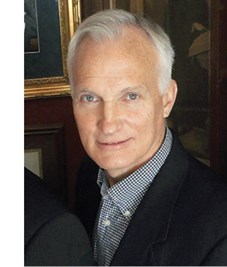
REMEMBERING OUR FIRST FREEDOM – Religious liberty is the bedrock of this nation’s founding. It is what drew many of the first settlers to its shores, fleeing persecution from established state churches in Europe. Once they arrived, they promptly established it in the framework of their new government.
“From the Pilgrims to the Puritans, to William Penn and the founding of Pennsylvania, to the Huguenots and many others, early settlers incorporated religious freedom into their founding charters,” said Stephen McDowell of Providence Foundation.
McDowell is part historian, part pastor, and part patriot who founded the Providence Foundation in the 1980s to train leaders of education, business, and politics to transform their culture for Christ. Along with extensive traveling, speaking, teaching, and writing, McDowell has also trained Christian tour guides. When word got out that Tim Wildmon was looking for experts to help with AFA’s Christian Heritage Tours in Washington, D.C., historian David Barton introduced McDowell to Wildmon. For the past 18 years, the two have worked together on Christian Heritage tours.
They make a strong team. As AFA fights to protect religious freedom, McDowell teaches people to recognize it at the very root of our nation’s founding. While assaults against Christianity come hard and fast, McDowell reminds people of the hard won paths taken to win freedom.
AFA Journal: What is the basis for religious liberty in the history of America?
Stephen McDowell: It’s a central part of what America is all about, a central reason the United States was established in the first place – so people could worship God according to the dictates of conscience, un-coerced by any earthly power. Our founders recognized civil government has no business telling people how to worship. But any time you come out of – as John Roberts with the Pilgrims described it – “the anti-Christian darkness” that existed in Europe, it is a gradual process to restore religious liberty.
A number of people took up this issue of advancing religious liberty. Thomas Jefferson wrote one of the best known documents, the 1786 Virginia Statute for Religious Freedom in which he makes the statement, “[T]o compel a man to [support] the propagation of opinions which he disbelieves is both sinful and tyrannical.” That idea is incorporated into the Constitution, particularly the First Amendment, saying “Congress shall make no law respecting an establishment of religion, or prohibiting the free exercise thereof.”
AFAJ: How is religious freedom understood, or misunderstood, today?
SM: The law is misunderstood by many. The original meaning, in essence, was that government shouldn’t have involvement in religion. It never meant God should have nothing to do with government.
But beginning in 1947, with Everson v Board of Education, the courts extracted the famous “wall of separation between church and state” phrase from a letter by Thomas Jefferson. He meant the wall was to keep government out of people’s affairs in religion, but they misconstrued it to mean God should have no part in government.
That has allowed civil government to intrude into personal affairs in a way it never has before, and to say God can’t be involved in public life. There have been rulings that you can’t have prayer in public schools, you can’t have Bible devotions, you can’t display the Ten Commandments on public property. In more recent years, there has been no freedom for photographers not to photograph or bakers not to bake a cake for a same sex ceremony. And the biggest effect might be the complete eradication of godliness from public schools. Our young kids are being taught God is irrelevant.
AFAJ: What is the road to maintaining religious freedom in the future?
SM: Most important is educating the American people on what religious freedom means. That can be done wherever education takes place: at home, in churches, in schools.
If we are ignorant of the great value of religious freedom, we will lose it. But that’s not set in stone. God can send a revival. If that revival is accompanied by a grasp of truth and the value of these principles, then there is a great hope for the future.
In the end, it is incumbent on churches and Christian homes to teach truth and send people out into the public square properly equipped in character and worldview. Eternal vigilance is the price of liberty. We as a people have to be eternally vigilant to maintain this precious freedom that our founders gave us.
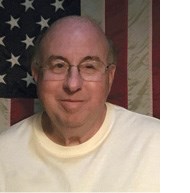 31. Bruce Barilla achw.org AFAJ 11/11
31. Bruce Barilla achw.org AFAJ 11/11
It took the grandson of Polish and Russian immigrants to appreciate and fight to acknowledge America’s religious liberties born from its Judeo- Christian heritage.
Bruce Barilla began working in 1992 by campaigning for states to adopt a Christian Heritage Week, recognizing America’s roots and the debt it owes to Christianity. He especially urged Christians to run for political office so that the nation’s religious heritage will continue to make a mark on the culture.
“When you carefully study the founding documents, you realize our Founding Fathers never intended for there to be a separation of church and state,” Barilla told AFAJ in 2000. “You also realize they wanted to secure certain precious rights for our citizens, but today, rather than government securing our rights, it is denying our rights in many ways.”
He soon added to that project educating citizens on their right to display nativity scenes and Christian symbols in the public square in celebration of Christianity’s central place in American history. He assists people in handling legal challenges that continue to arise each year regarding the legality of religious symbols’ rightful place alongside other Christmas displays in public spaces, or of privately sponsored nativities in the public arena. Barilla’s website offers resources and insights on both issues.
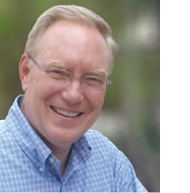 32. Eric Buehrer gtbe.org AFAJ 12/15
32. Eric Buehrer gtbe.org AFAJ 12/15
“The vast majority of educators have an erroneous view of separation of church and state and think schools have to be religion free zones,” Eric Buehrer told AFAJ. To validate that assertion, he simply points to laws already in place to ensure that people can practice and robustly build on the freedoms our Founding Fathers guaranteed in the Constitution.
Founder of Gateways to Better Education in 1985, Buehrer reassures parents and public school personnel nationwide that the Bible has a necessary and legal place in school curricula, especially when it comes to American history and heritage.
His impact has been immeasurable in motivating students to bring the Bible back into school and helping families navigate their inviolable rights to religious freedom.
In workshops for school systems, he informs teachers and administrators about existing laws and state academic standards that keep America’s Christian heritage a focus of school curricula.
He has inspired many people – children and adults – to reclaim religious freedom they had been misled into surrendering and bring their faith and values back to public schools. His website offers resources for parents, students, and teachers to discover their rights and how they can be incorporated into classroom application.
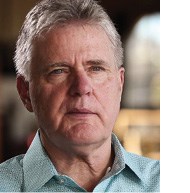 33. Jim Garlow jimgarlow.com AFAJ 09/16
33. Jim Garlow jimgarlow.com AFAJ 09/16
Jim Garlow, pastor of Skyline Church in La Mesa, California, brings the pulpit into the political arena. And he maintains that is well within the role of a pastor.
“I believe that the Bible speaks not merely to personal, family, and church issues, but also to national, community, and governmental issues,” he has said.
Garlow is well respected as an evangelical leader in politics, having made a noteworthy mark in 2008 for bringing nationwide attention in leading and organizing California’s Proposition 8, which defined marriage by law as only between one man and one woman. While the ballot measure passed voter approval, it was later overturned in federal court.
Garlow is also founder of the Pulpit Freedom movement. The movement emphasizes the importance of religious freedom for preachers speaking biblical truths from the pulpit, particularly about elections and candidates.
In this initiative, Garlow speaks out against regulations and unconstitutional efforts to curb religious freedom for pastors in the pulpit.
As a radio commentator on over 800 stations including American Family Radio, spokesperson for Alliance Defending Freedom, and a prolific author, his voice is heard by a nationwide audience as he works to preserve their religious liberties.
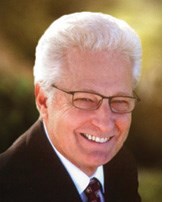 34. David Green hobbylobby.com AFAJ 09/14
34. David Green hobbylobby.com AFAJ 09/14
In 2000, David Green, founder of Hobby Lobby, spoke of the Christian principles by which the mega arts and crafts retail chain is managed, and attributed the company’s success to God’s blessing.
“We believe it is by God’s grace and provision that Hobby Lobby has endured,” Green said. “He has been faithful in the past; we trust Him for the future.”
In 2014, Hobby Lobby earned national attention for winning a landmark court case against the federal government. At issue was whether the government could force closely held corporations (more than 50% of the value of outstanding stock owned by five or fewer individuals) to comply with mandates that conflict with the owners’ religious convictions in the operation of the company.
Hobby Lobby’s suit against the U.S. government was rooted in the founding family’s well publicized Christian faith and values, which led the owners to contest President Barack Obama’s Affordable Care Act regulation that employer-sponsored health insurance plans must cover contraceptives and abortion services.
In June 2014, in an encouraging precedent for all businesses, the U.S. Supreme Court ended the suit in favor of Hobby Lobby and Conestoga Wood Specialties, a cabinet making company and co-litigant.
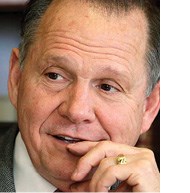 35. Roy Moore facebook.com/judgeroymoore AFAJ 10/03
35. Roy Moore facebook.com/judgeroymoore AFAJ 10/03
In 1995, Alabama Judge Roy Moore gained national notoriety as the man who prominently displayed the Ten Commandments on the wall behind the bench in his Etowah County Circuit Courtroom. The ACLU immediately filed suit, charging that the Ten Commandments and Moore’s courtroom prayers were illegal. The suit prompted national debate on the issue of separation of church and state.
The larger debate continues, often over the specific issue of Ten Commandments displays on public property. Moore’s consistent example has inspired people to respond and stand strong against such anti-Christian assaults.
Alabama voters elected Moore chief justice of the state Supreme Court in 2001. Since then, continued litigation has seen him twice suspended from the court (2003 and 2013) over similar issues.
“No matter what happens to me, I want to know that my four children can look back and say their daddy never did deny God,” Moore said.
At press time, Moore was running for U.S. Senate. He still holds fast to his faith, his freedom, and his facts rooted in American history and founding documents. He has challenged the nation to believe in religious freedom as set forth by the founders, and in the rightful place of Christian principles in American culture. 

Other articles in the 40 FAITHFUL series
We Salute You
God’s church in ministry
God’s first institution
God’s image in man
God’s Word and words